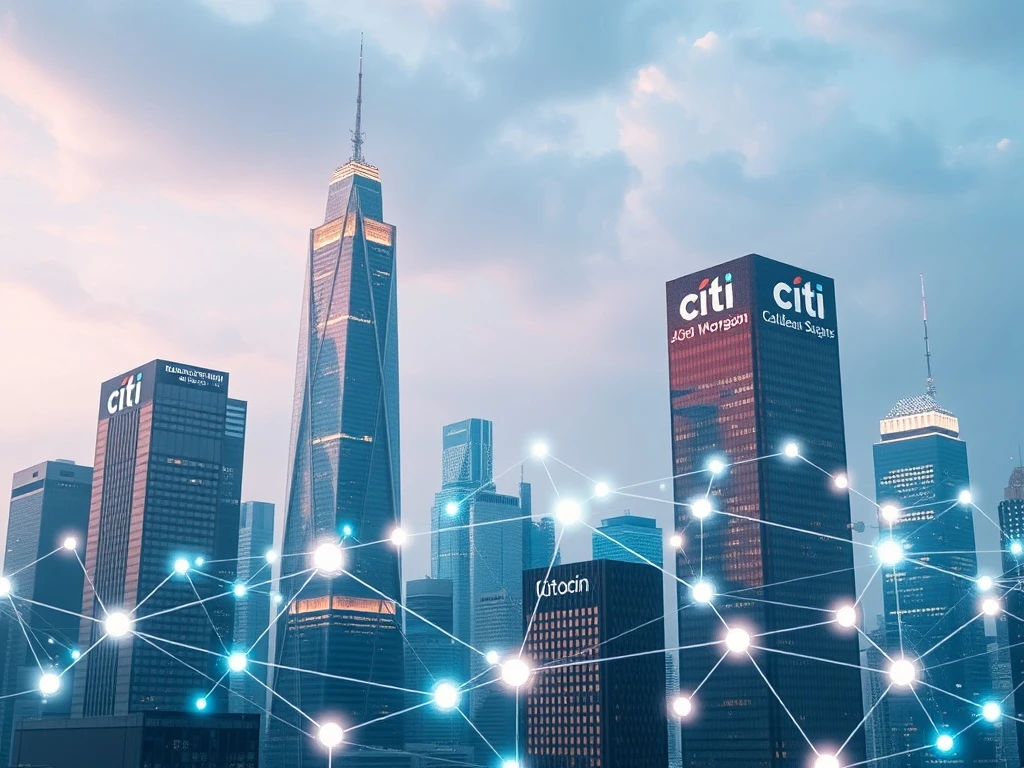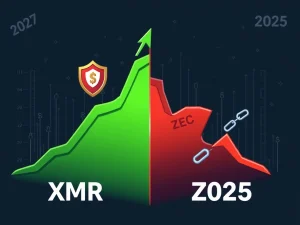TradFi Giants Unleash Massive Blockchain Investments: Citi, JP Morgan, Goldman Sachs Lead the Charge

The world of finance is undergoing a quiet, yet profound transformation. While often perceived as traditional, giants like Citigroup, JP Morgan Chase, and Goldman Sachs are not just observing the blockchain revolution – they are actively leading it. New data reveals their substantial blockchain investments, signaling a significant shift in how global finance views digital assets.
TradFi Blockchain Revolution: Are Financial Giants Embracing the Future?
A recent report by Ripple, in collaboration with CB Insights and the UK Centre for Blockchain Technologies, sheds light on the scale of this engagement. Between 2020 and 2024, global banks participated in an impressive 345 investments in blockchain companies. This isn’t just passive interest; it’s a strategic embrace of the TradFi blockchain future.
Leading the charge are names you’d expect: Citigroup and Goldman Sachs each recorded 18 deals, with JP Morgan and Mitsubishi UFJ closely following with 15 investments. These institutions are not just dabbling; they are making significant commitments, often in early-stage funding rounds. A notable trend is their participation in ‘mega-rounds’ – deals exceeding $100 million – contributing to 33 such rounds during this four-year period.
Global Systemically Important Banks (G-SIBs), those financial institutions whose failure could ripple through the global economy, accounted for 106 of these deals, including 14 mega-rounds. This shows a coordinated, strategic push by the most influential players in the financial sector.
Beyond the Hype: Where Are Blockchain Investments Flowing?
So, where exactly are these blockchain investments being directed? The report highlights several key areas where traditional finance sees immediate and future value:
- Trading Infrastructure: Enhancing efficiency and speed in financial markets.
- Tokenization: Converting real-world assets into digital tokens.
- Custody Solutions: Securely holding digital assets for institutional clients.
- Payment Solutions: Revolutionizing cross-border and domestic transactions.
Examples abound. Brazil’s CloudWalk secured over $750 million across two rounds, backed by Banco Itaú. In Germany, Solaris obtained over $100 million from SBI Group, later becoming a majority acquisition target. These are not small bets; they are substantial capital injections into firms poised to reshape financial services.
Driving Digital Asset Adoption: Why Banks Are All In?
The rationale behind this surge in investment becomes clear when examining broader industry sentiment. Ripple’s survey of over 1,800 global finance leaders revealed a striking statistic: 90% believe blockchain and digital assets will have a ‘significant or massive’ impact on the industry within three years. This widespread belief is a powerful catalyst for digital asset adoption.
Regulatory clarity is also playing a crucial role. Initiatives like the Guiding and Establishing National Innovation for US Stablecoins (GENIUS) Act in the US and the Markets in Crypto-Assets (MiCA) regulation in the EU are providing clearer frameworks for digital asset operations. This regulatory evolution reduces uncertainty, encouraging more traditional players to enter the space.
The demand for real-world blockchain applications is soaring. Citi’s report indicates stablecoin volumes hitting $650–$700 billion per month in Q1 2025. More banks are launching their own stablecoins, seeking to offer programmable money without the volatility associated with other cryptocurrencies. This direct engagement further fuels digital asset adoption.
The Tokenization Tsunami: Is Real-World Asset Tokenization the Next Frontier?
While stablecoins are a current focus, the future points to an even larger opportunity: tokenization. This process, which involves converting tangible and intangible assets into digital tokens on a blockchain, is poised for explosive growth.
Boston Consulting Group and Ripple estimate that tokenized real-world assets (RWAs) could exceed a staggering $18 trillion by 2033, demonstrating a compound annual growth rate of 53%. This projection highlights tokenization as a defining trend, offering unprecedented liquidity, fractional ownership, and efficiency for a vast array of assets, from real estate to art, and even commodities.
Banks are strategically positioning themselves to capture this immense market. Their early investments in tokenization platforms and infrastructure are laying the groundwork for a future where traditional assets are seamlessly traded and managed on blockchain networks.
Unlocking Value: The Promise of Real-World Assets on Blockchain
The move towards integrating real-world assets onto blockchain platforms is not merely a technological upgrade; it’s a paradigm shift for value creation and exchange. By tokenizing assets, financial institutions can unlock new levels of efficiency, transparency, and accessibility.
Imagine illiquid assets becoming tradable 24/7, or fractional ownership making high-value investments accessible to a broader investor base. This is the promise of real-world assets on blockchain. It offers reduced settlement times, lower transaction costs, and increased auditability, benefiting both institutions and their clients.
For TradFi giants, this means new revenue streams, enhanced risk management capabilities, and the ability to offer innovative products that were previously impossible. Their leadership in this space is not just about adapting; it’s about defining the next era of finance.
Conclusion: The Future of Finance is Now
The message is clear: traditional finance is no longer on the sidelines of the blockchain revolution. Led by powerhouses like Citigroup, JP Morgan, and Goldman Sachs, the industry is making substantial blockchain investments across critical areas like tokenization, custody, and payments.
This strategic embrace of digital assets, supported by evolving regulatory frameworks and a clear vision for the future of real-world assets on blockchain, signals a transformative period. As these financial giants continue to integrate blockchain technology, we can expect a more efficient, transparent, and accessible global financial system to emerge. The future of finance is digital, and TradFi is undeniably at the forefront of this exciting evolution.









